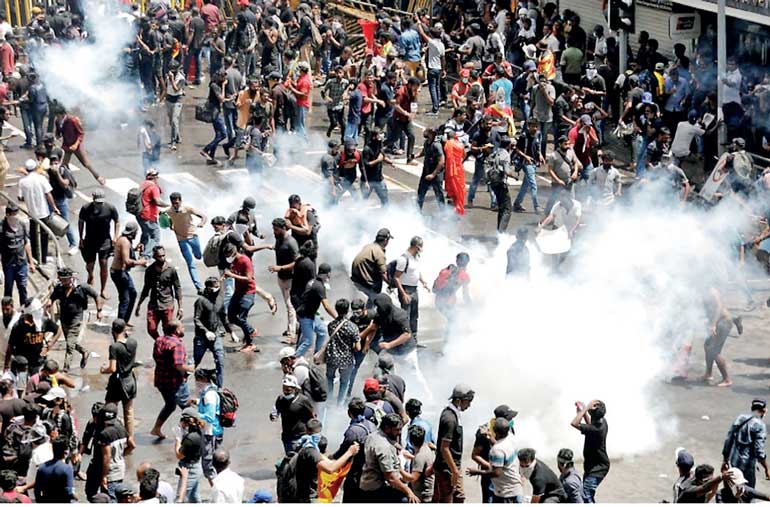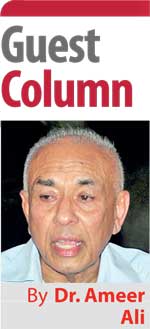Wednesday Feb 18, 2026
Wednesday Feb 18, 2026
Friday, 9 September 2022 00:14 - - {{hitsCtrl.values.hits}}

Aragalaya is not dead, despite RW’s repression
 ‘System change’, was the quintessential demand with which the new generation of youngsters rose in revolt against the Rajapaksa regime, heralded the Aragalaya and made a landmark in Sri Lanka’s post-independence history. That revolt, which caught the attention of international observers and humanitarian agencies, also meant that the intergenerational divide, which is having an impact on several epochal issues globally, such as global warming, human rights, gender equality and so on, is adding a new dimension to future developments in this country.
‘System change’, was the quintessential demand with which the new generation of youngsters rose in revolt against the Rajapaksa regime, heralded the Aragalaya and made a landmark in Sri Lanka’s post-independence history. That revolt, which caught the attention of international observers and humanitarian agencies, also meant that the intergenerational divide, which is having an impact on several epochal issues globally, such as global warming, human rights, gender equality and so on, is adding a new dimension to future developments in this country.
This revolt, led mainly by the Sinhala Buddhist youth and joined by their counterparts from other communities, soon grew into a national force to reckon with and caught the Government on the hop. Aragalaya’s virtual vote of no confidence on the 225 legislators and its call for President Gotabaya Rajapaksa (GR) to quit, found popular endorsement from the public and threatened to destabilise the status quo. This rebellious generation has come to realise that patchwork reforms and finetuning the existing socio-economic and political structures, are insufficient to pull this country out of its multiple crises and that a radical and systemic change is the only remedy to move forward.
Having forced a Prime Minister to resign and a President to run away – the two top men who commandeered the ruling system and manipulated it to benefit themselves and their dependents and followers – Aragalaya is now faced with a new challenge. It is confronting a new man at the helm, Ranil Wickremesinghe (RW), who has no popular mandate but only a legally recognised endorsement by a majority of the 225.
He also seems to have received silent approval from sections of the erudite and the pious of a geriatric generation, that consider him the best man for the season to restructure the economy and inject an air of normalcy in public life. In their view, RW’s liberal democratic credentials with a West oriented outlook and 45 years of parliamentary experience seem to be legitimate enough as substitute for popular mandate. RW himself berated that constitutional legality in the way he was chosen provided the required legitimacy to remain as president at least until the end of 2024, if not beyond.
With his presidential status assured, RW immediately turned his attention to deal with his enemy number one, Aragalaya rebels. This came as a surprise to many independent observers both at home and abroad, because he was sympathetic to the rebels’ cause and demonstrated support publicly when he was in Opposition. Why then is this volte face? On a personal level, he seems to have developed a personal grudge against the rebels after losing to arsonists his private residence with a library of around 10,000 books, according to him, during the post-Mahinda-resignation violence. There is only a lingering suspicion and no hard evidence yet to prove that those arsonists were Aragalaya rebels.
Apart from this personal retribution, RW’s anti-Aragalaya stand is a calculated precautionary move to prevent the IMF imposed economic agenda becoming a trump in the hands of rebels to provoke widespread protest against the presidency and its supportive parliament. RW knows very well, and CBSL Governor also endorsed his fear, that the IMF agenda in spite of recommendation for income support to the poor and the needy would ultimately hurt those very groups harder than the others. It was with this fear in mind that RW visited the Army Head Quarters in Akuregoda, thanked for and praised its services and apprised the commanders of future threats, which, needless to say, would include the Aragalaya. The continuing arrests and detention of hundreds of youths and activists in the aftermath of that visit speak volumes about RW’s motivation.
There are two fundamental issues on which RW’s so-called new system and Aragalaya’s systemic change collide. Firstly, Aragalaya’s demand for systemic change includes the principle of accountability of rulers to the ruled. To be precise, the rebels are fully aware that the current economic disaster was the product of gross mismanagement perpetrated by the Rajapaksa regime. The rebels and the public at large want those responsible to be brought to books. In contrast, RW is totally silent on this demand, because he owes his very presidency to Rajapaksas. He is virtually their prisoner. More than that, accountability in essence means eradication of corruption. Even though the IMF agenda includes this requirement as condition for the reforms to yield maximum benefits, there are no details about how corruption could be eradicated within the existing body politic. Corruption has become endemic and is part of the country’s culture. IMF recommendations are going to be implemented by a system that is corrupt from top to bottom, from ministers in the cabinet to judges in courts and clerks in government offices. To keep in line with those recommendations RW’s 2022 budget also contains certain income supporting measures to benefit the poor. But the weakest point is their implementation. This is why the World Bank in repurposing its previously agreed loans and directing them to issue fertiliser and fuel, is said to be “working closely with implementing agencies to establish robust controls and fiduciary oversight to ensure these resources reaching the poorest and the most vulnerable”.
Thus, the existing system of public administration, overseen by corrupt politicians, needs radical overhaul, and on that RW has said nothing. Yet, he describes his IMF backed reforms the beginning of a new system. To the Aragalaya youth this is patchwork and hypocrisy and not systemic change. RW’s grandiose ambition to transform the economy into an innovative export-oriented wonder and the country to First World status by 2048, would meet the same fate as GR’s “vistas of prosperity and splendour”, if the current system remains unchanged or finetuned. The second point of collision, is the future of ethnonationalism and particularly its Sinhala-Buddhist variety. Politics in Sri Lanka had been a fertile ground for the growth of ethnonationalism of all varieties and together they had been the stumbling block to create a united Sri Lankan nation. It is on the edifice of Sinhala-Buddhist nationalism that the political and economic structures have been erected in this country. Every government that came to power since 1947 embraced this pernicious ideology and promoted it. The former president GR for example, did not mince any words when he declared publicly that he was elected solely by Sinhala Buddhist voters, and that he would do anything to promote their interests and protect the Buddhist sasana.
His regular sessions with Buddhist monks only and in the name of injecting virtuosity in governance was only a smokescreen to advance Sinhala Buddhist hegemony. His Buddhist chauvinism reached its apogee when he appointed a task force filled with Buddhist monks and Buddhist chauvinists rather than qualified archaeologists to excavate and preserve ancient Buddhist ruins, particularly in the north and east of this country. This gave an open licence to the saffron army to encroach into precincts that are holy to communities of other religions and cultures.
Aragalaya youth realised how damaging ethnonationalism had been to the unity of this nation and its economy, which has all the ingredients necessary to emerge as another Singapore. That realisation underscored the youth’s commitment to remain not only apolitical but also areligious and a-ethnic. The rebels want ethno-nationalism to be abandoned in favour of an inclusive national ideology that would be inclusive, democratic and secular. But RW, his SLPP supporters and their affiliates would have no bar of it. All that the President could do therefore, is to try forming an all-party government with a jumbo cabinet to include a few minority representatives.
Sadly, even NPP for that matter, which is pro-systemic change and believes in inclusiveness and secularism appears to be reluctant to advocate that stand openly, because of the fear of losing votes at the ballot box. This also explains why when that controversial monk and Secretary of BBS, Ven. Gnanasara, declared in Kandy that Sri Lanka belongs only to Sinhalese, no Sinhala politician except the late Mangala Samaraweera dared to challenge or repudiate him. To that extent ethno-nationalism has pervaded the nation’s body politic.
Without accountability, eradication of corruption and renunciation of ethnonationalism, RW’s so called new system is nothing but old wine in new bottle.
The Governor of CBSL has predicted that the next confrontation between protestors and the Government would be bloody. IMF has laid the ground for such a confrontation. Its staff level agreement to grant an emergency loan of $ 2.9 billion is pittance when compared to the total amount needed to service the debt over the next four to five years. Even that paltry sum is not going to be made available immediately, and the reparation measures attached to it would not help to achieve the expected economic turnaround without concomitant systemic change.
Aragalaya is not dead, despite RW’s repression. UNHCR session in Geneva this month would feed further sustenance to the youth movement. The new generation would not rest but would continue its struggle even more resolutely until it achieves the final goal. It is an intergenerational struggle with unfinished business at the moment, but destined to win at the end, because history and world opinion are on its side.
(The writer is attached to Murdoch Business School, Murdoch University, Western Australia.)